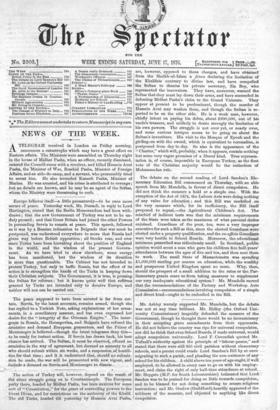The debate on the second reading of Lord Sandon's Ele-
mentary Education Bill commenced on Thursday, with an able speech from Mr. Mundella, in favour of direct compulsion. He did not think the measure a bold or a simple one. With the exception of the Act of 1874, the Labour Acts were doing nothing of any value for education ; and this Bill was modelled on the very measure which, for its inefficiency, the Bill itself proposed to repeal,—the Agricultural Children's Act. The mischief of indirect tests was that the minimum requirements of the State were taken as the maximum of what parental duties enjoined. Guardians of the poor, too, were a very improper executive for such a Bill as this, since the elected Guardians were elected under a property qualification, and the ex-officio Guardians were very hostile to School Boards. Moreover, the educational minimum prescribed was ridiculously small. In Scotland, public opinion would scout a man who gave his children five half-years' attendances between the ages of five and ten, and then sent them to work. The small State of Massachusetts was spending £1,000,000 sterling per annum on education, while the wealthy and prosperous United Kingdom spent no more. Why, then, should the prospect of a small addition to the rates or the Par- liamentary grants scare us from taking measures to supplement our very inadequate educational system ? Mr. Mundella moved that the recommendations of the Factory and Workshop Acts Commission—recommendations involving compulsion of a simple and direct kind—ought to be embodied in the Bill.


































